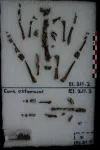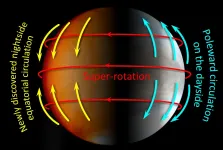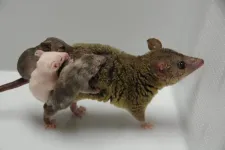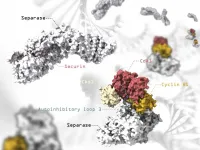The challenge of capturing carbon
2021-07-21
(Press-News.org) In the race to combat climate change, capturing carbon dioxide (CO2) emissions has been touted as a simple road to reach net-zero emissions by 2050. While the science behind carbon capture is sound, current technologies are expensive and not optimized for all settings. A cover story in Chemical & Engineering News, the weekly newsmagazine of the American Chemical Society, highlights the current state of carbon capture and work being done to improve the process.
Although efficiency improvements and renewable power sources can help, they are often expensive and will not be enough to counter the billions of tons of CO2 sent into the atmosphere each year, writes Associate Editor Craig Bettenhausen. Carbon-capture technology, implemented at the source of CO2 emissions such as power plants, could largely negate those emissions. Despite its promise, only one commercial power plant is using this technology today. Interestingly, oil and gas companies -- the main producers of CO2 emissions -- are now unlikely allies of those who are developing capture methods, spurred by competition from cheap renewable energy and consumer demand for low-carbon options.
At present, the most common form of carbon capture uses solvents to absorb CO2 and let through other, less harmful gases. While this method is well understood, it requires up to 50% of a plant's energy output, making it not a particularly "green" solution. Scientists are working to develop the next generation of carbon-capture technology, with solid sorbents and membranes showing promise. These materials require less energy and are already in use at some sites with concentrated CO2 emissions. The immediacy of the issue has prompted companies to begin developing other methods, including the use of cryogenics and metal-organic frameworks to absorb the gas. While the U.S. government is working with companies to subsidize carbon capture, critics say that it distracts from investing in renewable energy and regulating polluters. Progress is being made, but experts warn that the next decade will be the deciding period in which to find a solution to CO2 emissions.
INFORMATION:
The article, "The life-or-death race to improve carbon capture," is freely available here.
For more of the latest research news, register for our upcoming meeting, ACS Fall 2021. Journalists and public information officers are encouraged to apply for complimentary press registration by emailing us at newsroom@acs.org.
The American Chemical Society (ACS) is a nonprofit organization chartered by the U.S. Congress. ACS' mission is to advance the broader chemistry enterprise and its practitioners for the benefit of Earth and all its people. The Society is a global leader in promoting excellence in science education and providing access to chemistry-related information and research through its multiple research solutions, peer-reviewed journals, scientific conferences, eBooks and weekly news periodical Chemical & Engineering News. ACS journals are among the most cited, most trusted and most read within the scientific literature; however, ACS itself does not conduct chemical research. As a leader in scientific information solutions, its CAS division partners with global innovators to accelerate breakthroughs by curating, connecting and analyzing the world's scientific knowledge. ACS' main offices are in Washington, D.C., and Columbus, Ohio.
To automatically receive news releases from the American Chemical Society, contact newsroom@acs.org.
Follow us: Twitter | Facebook
ELSE PRESS RELEASES FROM THIS DATE:
2021-07-21
URBANA, Ill. - When kids sit down to eat lunch at school, fruits and vegetables may not be their first choice. But with more time at the lunch table, they are more likely to pick up those healthy foods. If we want to improve children's nutrition and health, ensuring longer school lunch breaks can help achieve those goals, according to research from the University of Illinois.
"Ten minutes of seated lunch time or less is quite common. Scheduled lunch time may be longer, but students have to wait in line to get their food. And sometimes lunch periods are shared with recess. This means the amount of time children actually have to eat their meals is much less than the scheduled time," says ...
2021-07-21
COLUMBUS, Ohio - The oral targeted therapy drug ibrutinib is an effective treatment option for high-risk hairy cell leukemia, according to a new study conducted by researchers at The Ohio State University Comprehensive Cancer Center - Arthur G. James Cancer Hospital and Richard J. Solove Research Institute (OSUCCC - James).
Hairy cell leukemia is a rare form of B-cell blood cancer that is diagnosed in 600 to 800 people annually in the United States. Researchers note that while the disease generally has a good prognosis for the majority of people affected, ...
2021-07-21
Domesticated rabbits come in all sizes and colors, including tiny Netherland Dwarfs, floppy-eared French lops, Flemish Giants, and fluffy Angoras.
These breeds belong to Europe's only rabbit species, originally limited to the Iberian Peninsula and Southern France and used for meat and fur since the last Ice Age, culminating in domestication about 1,500 years ago.
The Americas, on the other hand, have many rabbit species with ranges throughout both continents. The archaeological record shows rabbits were used as extensively in the Americas as they were on the Iberian Peninsula, with clear archaeological evidence that rabbits were being deliberately raised. Why, then, were rabbits domesticated in Europe and not the Americas?
Recent work ...
2021-07-21
A new University of Chicago study has found that the drug masitinib may be effective in treating COVID-19.
The drug, which has undergone several clinical trials for human conditions but has not yet received approval to treat humans, inhibited the replication of SARS-CoV-2 in human cell cultures and in a mouse model, leading to much lower viral loads.
Researchers at UChicago's Pritzker School of Molecular Engineering (PME), working with collaborators at Argonne National Laboratory and around the world, also found that the drug could be effective against many types of coronaviruses and picornaviruses. Because of the way it inhibits replication, it ...
2021-07-21
Older people appear to have fewer antibodies against the novel coronavirus, a new laboratory study from Oregon Health & Science University suggests.
Antibodies are blood proteins that are made by the immune system to protect against infection. They are known to be key players in protection against SARS-CoV-2 infection.
The study published today in the Journal of the American Medical Association.
"Our older populations are potentially more susceptible to the variants even if they are vaccinated," said senior author Fikadu Tafesse, Ph.D., assistant professor of molecular microbiology and immunology in the OHSU School of Medicine.
Tafesse and colleagues emphasized that even though they measured diminished antibody ...
2021-07-21
The average American spends 5 days each year in line by some estimates. Many of these lines are for things like a cup of coffee, movie theater tickets or a ride on the newest roller coaster, but for some the wait is for something far more pressing -- a new kidney.
In South Carolina, the average time spent on a waitlist for a kidney transplant is 42 months, but according to a recent paper in JAMA Surgery, changes to the U.S. kidney allocation system could result in reduced access to kidney transplants and longer times spent in line.
"At face value, the changes in the allocation system seem quite appropriate," said Derek DuBay, M.D., director of ...
2021-07-21
Common yeast are able to adapt and thrive in response to a long-term rise in temperature by changing the shape, location and function of some of their proteins. The surprising findings demonstrate the unappreciated plasticity in the molecular and conformational level of proteins and bring the power of molecular biology to the organismal response to climate change. Results from the Zhou lab at the Buck Institute in collaboration with the Si lab from the Stowers Institute are published in Molecular Cell.
Temperature is an unstable parameter in the wild, affecting almost ...
2021-07-21
Little is known about the weather at night on Venus as the absence of sunlight makes imaging difficult. Now, researchers have devised a way to use infrared sensors on board the Venus orbiter Akatsuki to reveal the first details of the nighttime weather of our nearest neighbor. Their analytical methods could be used to study other planets including Mars and gas giants as well. Furthermore, the study of Venusian weather granted by their methods could allow researchers to learn more about the mechanisms underpinning Earth's weather systems.
Earth and Venus ...
2021-07-21
Researchers at the RIKEN Center for Biosystems Dynamics Research (BDR) have succeeded in creating the first genetically engineered marsupial. This study, published in the scientific journal Current Biology, will contribute to deciphering the genetic background of unique characteristics observed only in marsupials.
Genetically modified animals, particularly mice and rats, are extremely important tools for researching biological processes. For example, researchers often silence genes to find out what their normal functions are. Since marsupials have unique characteristics, studying them requires developing ...
2021-07-21
During cell division, chromosomes are duplicated and separated so that one copy of each chromosome is inherited by each of the two emerging daughter cells. Correct distribution of chromosomes requires high accuracy and defects in this process can cause aberrant distribution of chromosomes and facilitate cancer development. By analyzing the structure of the protein responsible for chromosome separation, an international team, led by scientists from the University of Geneva (UNIGE), has shed light on the mechanisms controlling this essential player in cell division. This work is published in the journal ...
LAST 30 PRESS RELEASES:
[Press-News.org] The challenge of capturing carbon





